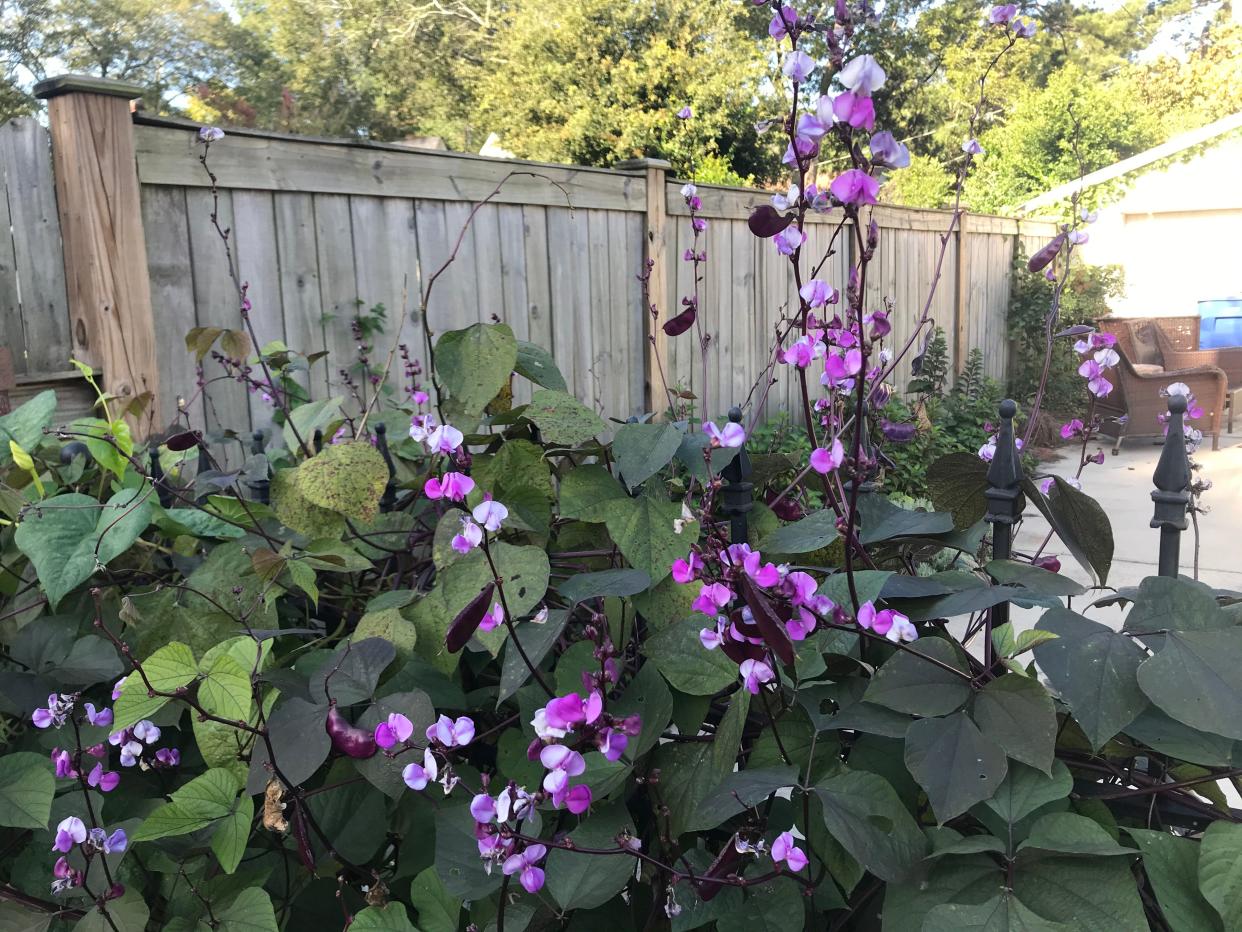Master Gardener: Hyacinth Bean Vine covers the bases

The Hyacinth Bean Vine grows fast and functions as an ornamental plant, food source, butterfly magnet and even works as a beautiful privacy fence.
It likes ample water with good drainage but keep soil moist, not soggy, to keep it from getting droopy in the heat. Growth spurts in early summer with blooms and pods continues all summer long. No maintenance needed like deadheading.
The Hyacinth bean first shows off with violet-tinged green leaves, each with three leaflets in an oval triangle formation.
It blooms profusely with flowers that resemble sweet peas in lavender purple, white or rose with light red hues. These clusters grow on short stalks and later form purple pods that are gorgeous. Each pod is approximately 3-6” in length and contrasts dramatically with the foliage.
Early leaves and flowers are edible and eaten raw or steamed like spinach. Although you need to research exactly which one of these are specifically edible as they may cause serious illness.
The dried beans are TOXIC. Don’t Eat!
Hyacinth Bean originated in the tropical region of Africa and dates back to the New Stone Age in India as well. Hyacinth Bean Vine is popular in the south, where they’re typically grown for ornamental value and to provide shade and privacy.
Not truly a bean but a fellow member of the pea family.
When planting as an annual in Ohio the ground temperature must be above 50 degrees. Plant 1½ inches deep and to speed up germination soak the beans in warm water and they will split open and grow quicker. You can always start them inside early and be ready after the last frost to get them planted outside. It’s a climber so make sure your trellis or pole is sturdy and at least 8 feet tall. I grew mine on my clothesline pole and it continued after reaching the top of the pole down the lines itself on both sides. Absolutely beautiful vine and so maintenance free on one side of my gazebo, it was perfect.
Kim Harsanje is a Master Gardener for the Sandusky and Ottawa County Extension offices.
Sign up for the 2023 Master Gardener class
If you have been following our weekly gardening articles and like them why not join the next Ohio State Master Gardener class in 2023? You will learn all the ins and outs of gardening.
Just exactly does that mean? Well, you asked a good question. The Master Gardener program offered through the Ohio State Extension is a volunteer program that will train you in the science and art of gardening. You will then educate the public with gardening and horticulture knowledge. Sounds great — right.
The Sandusky/Ottawa county Master Gardeners are working with The Ohio State University in offering residents an opportunity to become a Master Gardener: to learn the do's and don’ts of garden care, and to make the wrongs right.This unique program got its beginning in the 1970s in the state of Washington when Dr. David Gibby found more residents were calling him for information than the time he had on hand. He began a program to train volunteers to do outreach work for home gardeners.
This education program has spread to all 50 states and multiple countries. In Ohio the program started in the late 1970s. We answer gardening questions, operate an annual plant sale, and provide community education at various community events such as the Fremont Farmers Market, Schedel Arboretum and Gardens, Grove Fest at the Hayes Presidential Spiegel Grove and Creek Bend Farm. Get involved with answering gardening questions by becoming the “Ask a Master Gardener.” You will have the entire Ohio State University Agricultural Department at your fingertips for answers.
We provide space for a community garden. Presently there are 26 active Master Gardeners in Sandusky and Ottawa counties that have gone through the training classes. After completion you will be required to complete 20 hours of volunteer time and 10 hours of education yearly. What could be easier? The class meets one day a week from 9-3 for 10 weeks. And we provide lots of great food during the sessions. Yum.
Contact our office at 419-334-6340 for more information.
This article originally appeared on Fremont News-Messenger: Hyacinth Bean Vine is ornamental, beautiful, and easy to grow

